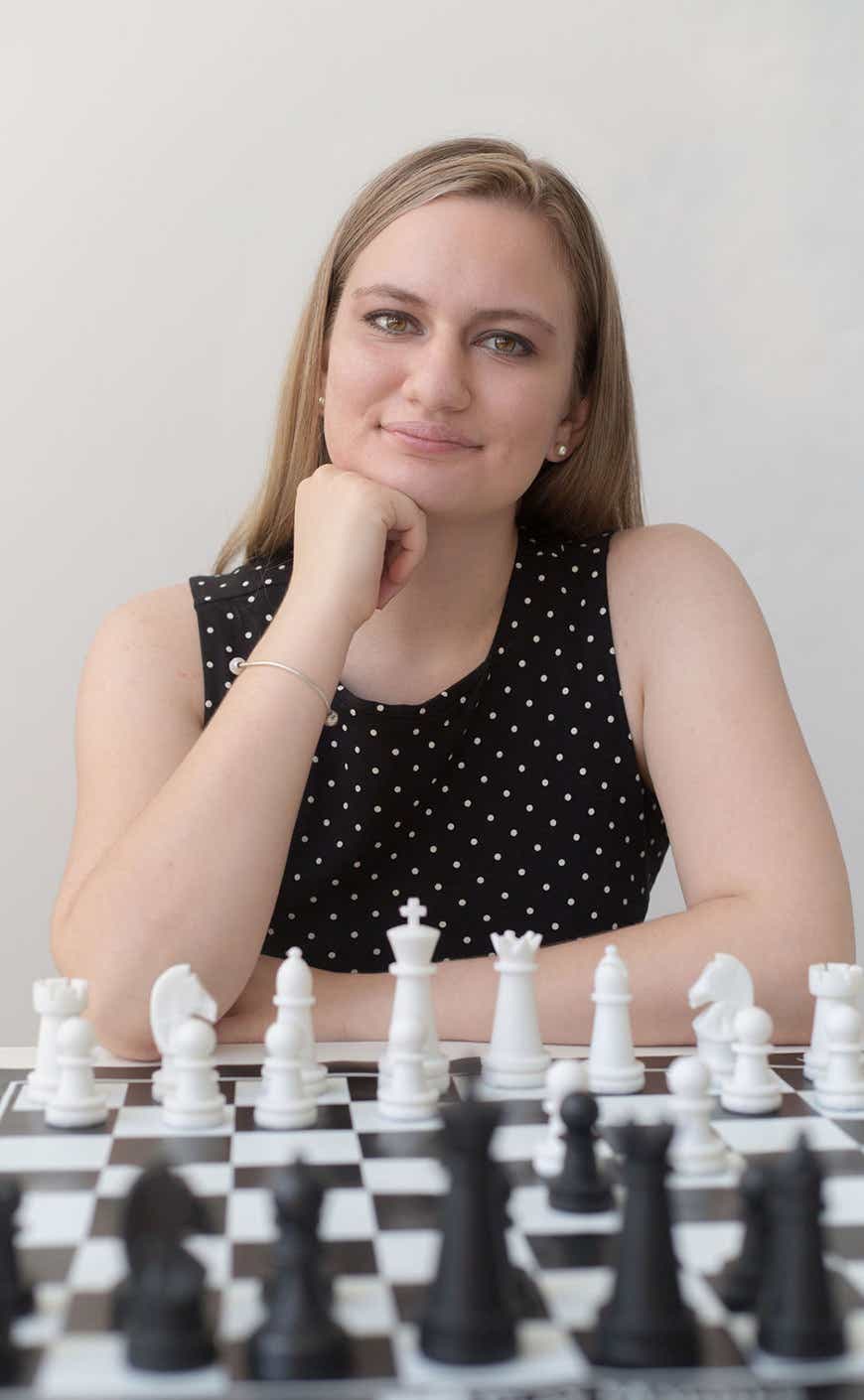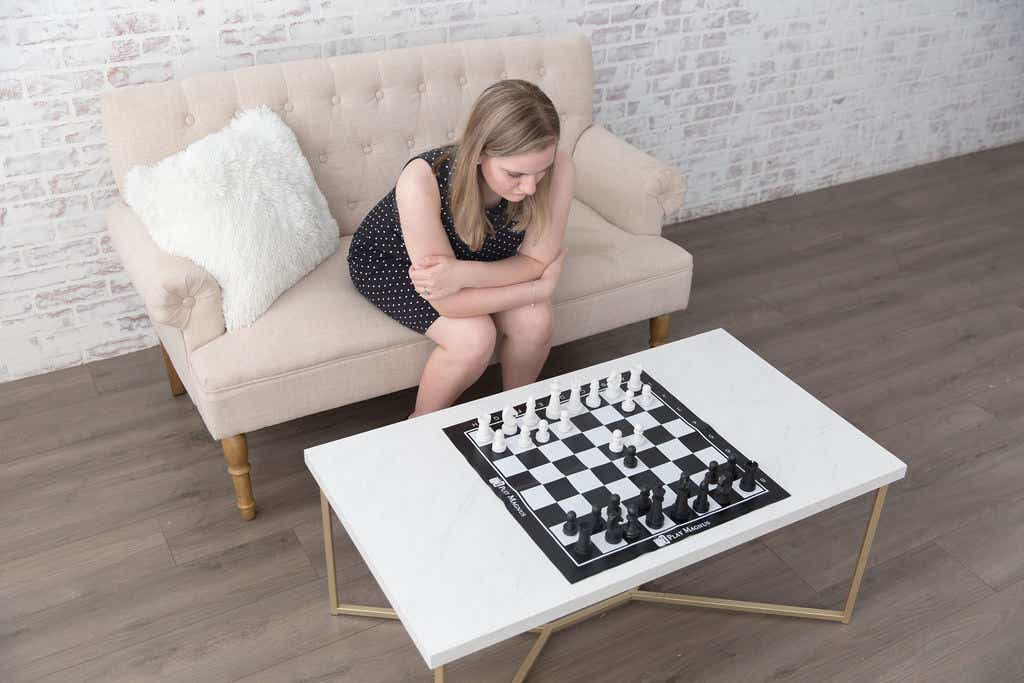Years before the popular Netflix series The Queen’s Gambit hit the small screen and received Emmy nominations, a four-year-old girl named Ashley Lynn Priore beat her father in a game of chess for the first time. At age eight, she was teaching chess classes at her local library. Before even attending college, Ashley would become a nationally ranked chess champion with the United States Chess Federation. Now at the tender age of 21, Ashley is tackling one of the most complicated problems in chess: sexism. She’s doing it through an organization that encourages young women to start playing chess at an early age. Founded in 2014, it’s called — you guessed it — Queen’s Gambit. She spoke with KCM about her thoughts on the show, her own experience as a young woman competing in what is still seen as a man’s game, and why she thinks all young people can benefit from learning chess — whether they’re prodigies or not.
KCM: So we know The Queen’s Gambit isn’t based on a true story (it’s based on a book) or one individual woman specifically. And you are way beyond its time. But we have to ask…were you annoyed that the TV show took your organization’s name?
Ashley Lynn Priore: It’s strange! At first, I was telling everyone, “we were here first!” But honestly, it’s really the only move in chess that revolves around the queen. So we may not have been too creative when we came up with the name!
How old were you when you realized that you had a gift?
I was four. My brothers started playing first, and I was upset that they were learning and my sister and I weren’t. So I just watched them play, and somehow I just knew how the pieces moved. I had this sense of the basics, and how everything worked. And then I played my dad, and I beat him in just a few moves.
My siblings and I all went on to play competitive chess, and this was back when it was sort of strange for kids to play chess. It was still seen as something that only nerds did. I also happened to be homeschooled when I was little, so when you’re a student who is homeschooled and you’re playing chess, you’re seen almost as a science experiment.
Even at chess tournaments, people thought my sister and I were strange, since we were women. When you’re in a competitive space and you don’t see anyone who looks like you, it’s really hard, because you feel like you have to prove something. That experience of being a woman in chess is what got me into teaching, and that’s what I really fell in love with.
Why do you think women have historically been excluded from the game?
Even when we look into politics, and women getting the vote, historically people did not think that women had the capabilities to handle anything difficult. That’s what people used to say about women in chess. I once taught a girl who was really upset because her dad said that she was too emotional to play chess at her age because she got upset when her pieces got captured. These stigmas are so ingrained in our culture. Chess is a game that requires strategy and critical thinking, and historically men have been considered “better” at those skills. So men played it and assumed that young women and girls wouldn’t be interested in it. I also think it has to do with it being a sport. There is such a gender divide in all sports. A lot of these sexist social issues are connected, and so men continue to dominate in certain fields because it’s deemed that they know more about them, when really women aren’t even given a chance.

Have you watched the Netflix series, and what did you think of it?
Yes! I went through several different waves of emotions. When I first heard about it, I was excited, because as a chess player, all press for chess is good press. We don’t really meet a lot of people who are excited about chess and want to talk about it. Then there was the sense that chess was making a comeback, just like it did when Bobby Fischer became the United States champion. So I was really excited at first.
As a work of art, the series was excellent, but I definitely thought it had some flaws. The fact that Beth became celebrated and appreciated as a player so quickly, especially as a woman, that’s not realistic. I’ve played against men who have called me really horrible, derogatory things, and this is 50 years later than the decade the show took place in. I just think there’s no way that as she continued to be successful, that so many men would be supporting her like that, or that a grandmaster would kiss her hand after she won. That was not realistic at all, and I worry that it is going to give young women entering the game a false sense of security. The assumption from the show is that a woman would go to play competitive chess, and she would be celebrated. That just hasn’t been the case, in my experience. There are still so many men who play chess that are sexist and that don’t think that women can do it. But you have to remember, this series is based off of a book that was written by a man. It was produced by a man. That certainly impacts the storytelling.
Do you think the show’s popularity will encourage more young women to play chess for the first time?
I’ve been thinking about that a lot. Initially I worried that it would just be a 2020 fad, and that people would move on. I think that it has sparked a lot of discussions in the chess world about women, and how we can create environments that support women and girls, and general diversity and inclusion in the game. But I’m not sure if anything will change. The entire governing body of U.S. chess is still a bunch of older white guys.
One positive thing is that more people are playing chess in general — it’s normalized that the everyday person can sit across the board at home and play chess for fun. I think before the show, chess was seen as something exclusive. Now, people are certainly learning about the game more, but competitively, I’m not sure what the impact will be.
You said that when you were younger, people thought you were a nerd for playing chess. Do you think that’s changed since the show came out?
I was talking about this with a few eighth graders and early high school female competitive players. And their reaction was, “Now I feel like when I go to a tournament, I’m going to have to dress up and look pretty like Beth Harmon did, and I can’t just wear my sweats.” I hope that young people will admire their female peers more who play, but a part of me also worries that kids will think these girls are just trying to copy a character they saw in a TV show. We have great female figures who are doing awesome things in the game, but I’ve talked with a few male coaches who have watched the show and they say it’s making chess “sexy.” That worries me.
I think if we first can teach chess as a tool that anyone can use to empower themselves, then we’ll be able to branch out from that and include more women in competitions. It’s almost comparable to the process we’ve seen play out in our government. If I was a little girl and I saw Vice President Harris elected to office, I would’ve felt so inspired. I remember being devastated when Hillary Clinton lost. But seeing now that we’ve made that progress, and there are so many more women in elected office, it makes me feel like it’s possible in the chess world, too. I always find myself comparing chess in politics, because people use both of them as a way to solve problems.
It seems to like that’s at the heart of what you are trying to do for young women with your organization, Queen’s Gambit — to increase visibility for young women and make them feel like there’s a place for them in what has historically been seen as a man’s world. Is that right?
Absolutely. Chess is my passion, and I see it as a vehicle for change and empowerment. Chess can still be a competitive game, I don’t want to take away from that aspect, but I think too often it’s considered aggressive — like there’s just a winner and a loser. When we are analyzing games in chess class, we never talk about who won. We talk about the journey to getting to that point. And that’s really what Queen’s Gambit is all about — inspiring and empowering young people to see that chess can help you develop skills that you can use to achieve any of your goals.
Chess is a game that requires many skillsets. We talk about strategy and tactics. Sure your overarching goal is to win, but you need to have smaller goals within that in order to achieve that overarching goal. So if you are a young woman and you’re interested in a career in STEM, what are those small steps that you can take to get to that overarching goal? They’re learning chess, but they’re also learning how to create roadmaps for themselves. That’s what I think is so fascinating about the game. It parallels life. You think about your end goal — your checkmate — and to get there, your path often includes sacrifices. That’s where our name Queen’s Gambit comes from — it’s a specific move in chess where you sacrifice something early on to gain something greater later on. I say that to parents all the time — we can inspire kids, and teach them chess, but along the way, they’re gonna learn a lot about themselves.
Written and reported by Emily Pinto









